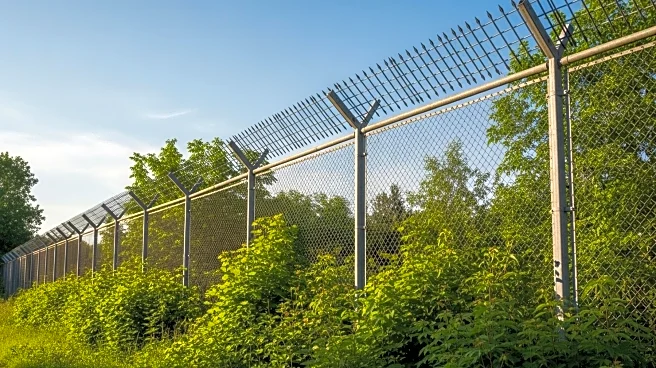What's Happening?
Poland has reported a significant increase in attempts to illegally cross its border with Belarus during the summer months. Between June and August, Polish border guards recorded 13,800 attempts, a notable rise from 7,500 attempts in the same period last year. This development follows Poland's efforts in 2022 to secure its border with a 5.5-meter-high fence and electronic surveillance systems. The Polish government, along with the European Union, accuses Belarusian leader Alexander Lukashenko of orchestrating the movement of migrants from crisis regions to the EU's external border as a means to exert pressure on Western nations. The border, which spans approximately 400 kilometers, is a critical point of entry into the EU and NATO member state Poland.
Why It's Important?
The increase in migrant crossings at the Poland-Belarus border highlights ongoing geopolitical tensions in Eastern Europe. Poland's actions to fortify its border reflect broader concerns within the EU about migration pressures and security threats. The situation underscores the complex relationship between Belarus, an ally of Russia, and EU member states. The influx of migrants poses challenges for Poland's border security and has implications for EU migration policies. The issue also raises questions about the humanitarian treatment of migrants and the political strategies employed by Belarus to influence EU dynamics.
What's Next?
In response to the escalating situation, Poland's interior ministry has extended the restricted zone along the Belarus border for an additional three months, until December 4. This zone, which varies in depth from 200 meters to four kilometers, is accessible only to security forces and residents, with journalists and aid organizations requiring special permits. The extension aims to enhance border security and manage the flow of migrants. The EU may continue to monitor the situation closely, potentially leading to further diplomatic engagements or policy adjustments to address the migration crisis and its root causes.
Beyond the Headlines
The ongoing border tensions between Poland and Belarus may have broader implications for EU-Russia relations, given Belarus's alliance with Russia. The situation could influence EU foreign policy, particularly in terms of sanctions or diplomatic efforts aimed at Belarus. Additionally, the humanitarian aspect of the migrant crisis may prompt international organizations to advocate for more comprehensive solutions to address the needs of displaced individuals and prevent exploitation by political regimes.










